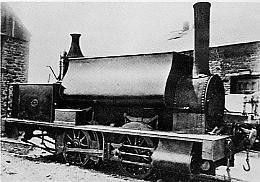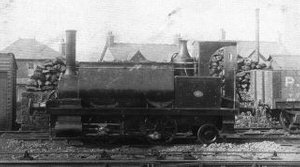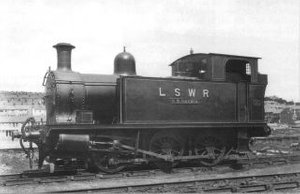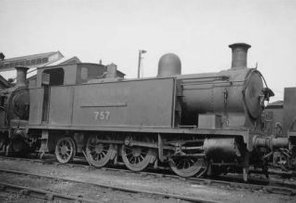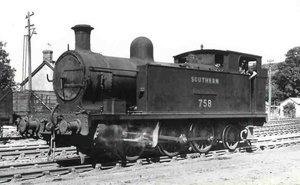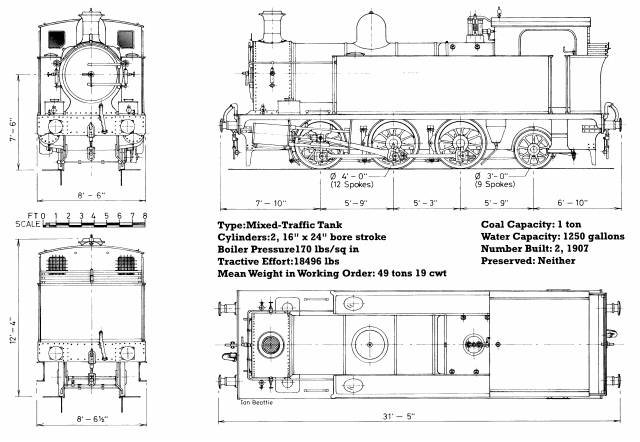Locomotives of the PD&SWJR
ECMR - Neilson locos
The East Cornwall Mineral Railway (ECMR) had two 3' 6" gauge 0-4-0STs, numbered 1 and 2, which were built for it in 1871 by Neilson & Co of Glasgow (works numbers 1660 and 1661). These engines were of typical Neilson appearance with stovepipe chimneys and 'ogee' style saddle-tanks, and were built to the following dimensions:-
As built No. 2 after rebuild
Coupled wheels 3ft 1in 3ft 1in
Wheelbase 5ft 5ft
Cylinders 10in x 18in 10.5in x 18in
Boiler pressure 85psi 115psi
Heating surface 597 square ft 674 square ft
Working weight 11ton 15cwt 17ton 5cwt
As far as is known the ECMR livery was plain black, with red buffer-beams and wheels. In common with the rest of the ECMR rolling-stock the Neilson engines had centre buffer-couplers and also side-chains. In due course these locomotives passed with the line into the ownership of the Plymouth, Devonport & South Western Junction Railway (PD&SWJR) and continued working under the new regime without alteration
With the conversion of the line to standard gauge the fate of both of these locomotives is not entirely clear. No 2 was re-gauged to 4' 8½"in the works at Callington and converted to a 0-4-2ST, with a new cab and vacuum brakes being added. Some sources say that No 1 was converted also (although possibly without the addition of vacuum brakes), only to be sold in 1909. Another source says that it was taken out of service in 1907 and sold later in 1912 without having been converted. In July 1912 ex-ECMR No 2 was sold to Colonel Stephens for £250 and he transferred it to the Selsey Tramway line, where it was re-built yet again and gave useful service under the new name of 'Hesperus' until it was withdrawn and scrapped in 1927.
A. S. HARRIS
An 0-6-0 side tank Works No. 2697 was delivered by Hawthorn Leslie to Bere Alston station on 31st Oct. 1907 The name painted on the side was H. S. Harris but this was quickly removed and replaced with brass nameplates 'A. S. HARRIS' and became PD&SWJR No. 3
When the railway was absorbed into the LSWR in 1922 it was allocated No. 756 but never carried LSWR livery. After the grouping in 1923 the SR applied the number. In June 1929 the SR replace 756 with an '02' class 0-4-4T and 756 was tried on the Wenford Bridge mineral branch then at various times shunted at Winchester, Fratton, Bournemouth, Brighton Tonbridge, Folkeston, Dover and at Eastleigh working as pilot until 1931 when it was transferred to Nine Elms where it stayed as shed pilot until 1939 then to Stewarts Lane. At nationalisation in 1948 the number 30756 was allocated but never carried as A.S. Harris was withdrawn on 27th Oct. 1951 after being condemned with fire box problems and was scrapped at Eastleigh ----
SEE VIDEO BELOW
EARL of MOUNT EDGECUMBE LORD St LEVAN
Hawthorn Leslie dispatched the two goods engines on Boxing Day 1907 complete with brass name plates 'Earl' PD&SWJR No. 4 'Lord' PD&SWJR No. 5
They were 0-6-2T (works numbers 2695 & 2696) and in appearance they were enlarged versions as A.S.Harris though dimensionally they were considerably bigger and for their size were very powerful, their rated haulage capacity was greater than that of a 2MT tank.
Both loco's passes into the SR without carrying their LSWR numbers and it was left to the SR to inscribe them 757 & 758 though in a fit of post-grouping South Western enthusiasm 'Earl' appeared inscribed LSWR. Both loco's stayed on the branch into BR days except for a brief period in August 1926 when 'Lord' took part in trials on the newly opened ND&CJLR After nationalisation they became 30757 & 30758 but slowly '02's and Ivatt's took over. Both engines could be seen at Plymouth in 1955. In 1957 both went to Eastleigh 'Lord' to be scrapped and 'Earl' for a final fling as shed pilot before succumbing.
The livery of the PD&SWJR's loco's was blue with copper cap chimney, dome covers and safety valve bases but after 1912 they were painted LSWR green.
0-6-2T 0-6-0T
Cylinders (outside) 16in x 24in 14in x 22in
Coupled wheels 4ft 0in 3ft 10in
Coupled wheelbase 11ft 0in 10ft 6in
Total wheelbase 16ft 9in 10ft 6in
Radial wheels 3ft 0in -----------
Heating surface 1,017sq ft 697sq ft
Boiler pressure 170 lb 170 lb
Grate area 16.5sq ft 11sq ft
Tractive effort 18,495 lbs 13,345 lbs
Weight in working order 47ton 3cwt 35ton 15cwt
